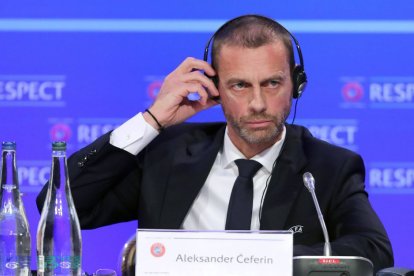European court rules against UEFA and FIFA on Super League
The rules they established to prohibit this new league, which would compete with the Champions League, were deemed "unlawful" by the EU.

Aleksander Ceferin, presidente de la UEFA
The Court of Justice of the European Union (CJEU) has ruled that the rules imposed by the International Federation of Association Football (FIFA) and the Union of European Football Associations (UEFA) to ban the Super League are "illegal." The promoters of this competition (Florentino Pérez, president of Real Madrid, and Andrea Agnelli, former president of Juventus) want it to replace the current continental tournament, the UEFA Champions League.
The court argues that FIFA and UEFA "are abusing a dominant position" when it comes to the future of continental soccer.
"The FIFA and UEFA rules making any new interclub football project subject to their prior approval, such as the Super League, and prohibiting clubs and players from playing in those competitions, are unlawful," explained the CJEU in a statement. "There is no framework for the FIFA and UEFA rules ensuring that they are transparent, objective, non-discriminatory and proportionate. Similarly, the rules giving FIFA and UEFA exclusive control over the commercial exploitation of the rights related to those competitions are such as to restrict competition, given their importance for the media, consumers and television viewers in the European Union."
Despite having ruled in favor of Super League backers, the court clarified that "it does not mean that a competition like the Super League project must necessarily be approved."
UEFA: Ruling does not validate Super League
Through a letter, UEFA was cautious about the CJEU ruling, ensuring that "it remains firm in its commitment to maintaining the pyramid of European football." However, it highlighted that the ruling does not imply that the Super League project will go ahead, that it simply "underlines a pre-existing lack in the prior authorization framework of the UEFA":
FIFA was much more neutral with its statement, stating that they will analyze the resolution with all confederations and associations before giving their opinion on the CJEU resolution.
Real Madrid and FC Barcelona express satisfaction
Initially, 12 of the most important teams in European soccer (Arsenal, Chelsea, Liverpool, Manchester City, Manchester United, Tottenham Hotspur, Atlético de Madrid, FC Barcelona, Real Madrid, AC Milan, Inter Milan and Juventus) agreed to form the Super League. However, little by little, nine of them abandoned the project, leaving Real Madrid, FC Barcelona and Juventus as the only ones left in support.
"At Real Madrid we welcome with enormous satisfaction the decision adopted by the Court of Justice of the European Union, which is responsible for guaranteeing our principles, values and freedoms," said Real Madrid President Florentino Pérez. "European club football is not and will never again be a monopoly. From today, the clubs will be the masters of their destiny."
FC Barcelona also expressed approval. Through a statement, the Spanish team expressed its "satisfaction with the ruling of the Court of Justice of the European Union (CJEU) in which the Super League project is endorsed," in addition to "considering that the ruling opens the way to a new top-level football competition in Europe."
Recommendation





















